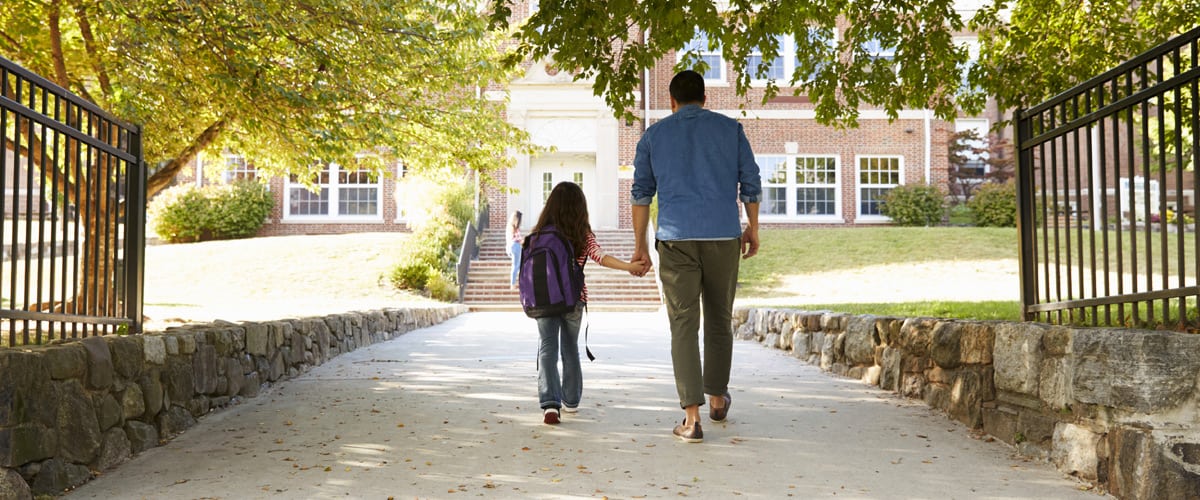How To Help Kids Handle School Anxiety
As children prepare to go back to school, a psychologist shares strategies for reducing school anxiety and how to identify early signs of stress.

While many students are eager to return to the classroom this fall, for others, school can cause feelings of stress and anxiety.
“Back-to-school jitters are very common, and some school anxiety is normal,” says Dr. Shannon M. Bennett, the associate director of the Center for Youth Mental Health at NewYork-Presbyterian. “The anxiety should pass relatively quickly once the new year becomes routine. If it persists or starts to interfere in the child’s or family’s life, that’s when we would recommend seeking out an assessment or additional support.”
Anxiety disorders are the most common type of childhood mental health diagnosis, affecting 8 to 10 percent of school-age children (ages 5 to 12 years). Some studies suggest as many as 1 in 3 adolescents has an anxiety disorder before age 18.
“For youth who have an anxiety disorder, such as social anxiety, separation anxiety, or worry about school performance, going back to school can be challenging,” she adds. “Common triggers for anxiety are transition, changes in routine, or starting something new — and back to school incorporates all three.”
The silver lining: If your child is dealing with school anxiety, there are practical tips for managing these feelings and well-studied treatment methods. For more on back-to-school jitters, Health Matters spoke to Dr. Bennett.
How can parents help soothe a child with anxiety about school?
Dr. Bennett: The start of the school year brings new learning experiences, getting new school supplies, new clothes, new books, and making new friends. I think it’s always good to focus on a child’s strengths and the positive when facing an anxious situation. Other tips to help your child cope with school anxiety include:
- Prepare in advance. Touring the school before the school year begins and meeting your child’s teachers could help familiarize students with their surroundings once school starts. If your child is going to be attending a new school, you can try to connect them ahead of time with another kid or group of kids who’re going to be in the school. What’s more, getting your child acquainted with the physical sights and sounds and smells can help their body be less on guard when they enter this new environment.
- Talk to your kids about the routine. If there’s a new schedule, go over what’s involved and discuss what classes they will be taking, so they can have some sense of knowing what’s to come. This helps with the unknown and the unpredictability of it all. It can also be very helpful to practice the morning routine ahead of the first day of school to get kids used to waking up and getting out the door on the right timeline.
- Create a list of positive messages. It can be helpful for kids to write a list of what we call “positive coping statements” or “positive self-statements” that are grounded in evidence or realistic thinking. They can keep the list in their pocket and look at in on the first day of school if they’re feeling anxious. This could be “I can do this, there are people there to support me,” or “I’ve tried new things before, and it went OK.”
- Try mindfulness meditation. There are a lot of mindfulness apps and programs that kids can try on their own. Mindfulness is focused on being in the present moment. When we’re anxious about something that could happen in the future, or we’re stuck on something that already happened in the past, mindfulness helps us to focus on what’s happening in the present moment, and we become better able to tolerate the feelings we find there.
Do deep breathing. One straightforward, yet effective, strategy is deep breathing. Deep breathing can be done anytime, anywhere by taking a few slow deep breaths to help to calm one’s body down and regulate the nervous system. Kids can practice it in the evening, in the morning before school, and in the classroom. It can also be helpful before taking tests.

Dr. Shannon Bennett
What else can kids do on their own to cope with their anxiety?
Youth and parents can put together a list of what we call positive coping statements or positive self-statements that are grounded in evidence or realistic thinking, which can help kids weather their anxiety. This could be “I can do this, there are people there to support me,” or “I’ve tried new things before and it went OK.” These realistic coping statements can be helpful for kids to have in a list to keep in their pocket so they can look at that on the first day of school if they’re feeling nervous.
Mindfulness meditation is also very good for anxiety. There are a lot of mindfulness apps and programs that kids can try on their own. Mindfulness is focused on being in the present moment. When we’re anxious about something that could happen in the future, or we’re stuck on something that already happened in the past, mindfulness helps us to focus on what’s happening in the present moment, and become better able to tolerate the feelings we find there.
As kids get older and become teenagers, how does school anxiety change and what advice do you have for caregivers?
Teenagers may have different anxiety triggers from younger children. For example, teens may be more anxious about social acceptance, school performance, and/or tryouts for sports teams, theater, or other after school activities. It is also trickier if teens are refusing to go to school or may be avoiding class without their parents knowledge. Building a relationship with trusted school personnel, teachers, and/or school counselors can be helpful to ease the transition for teens and parents of teenagers, in addition to the other strategies mentioned above.
When should parents get extra help in dealing with school anxiety?
When anxiety is making life difficult for a child or for their family, or has persisted for several weeks, I recommend meeting with a psychologist, child psychiatrist, social worker, or other mental health professional for an assessment and potentially for treatment if recommended. If anxiety progresses to the point of panic attacks or is really impacting a child’s mood, I recommend seeking help sooner rather than later.
I’d also seek help quickly for a child who is refusing to go to school. The longer a child stays out of school, the harder it becomes to return.
Similarly, if a child doesn’t want to go on play dates or is avoiding after-school activities or other positive social and academic activities, this can be a sign that additional help is needed.
The avoidance caused by anxiety robs children of the opportunity to learn that they can handle a healthy dose of stress. They also miss out on not just the academic lessons of school but also the social and life lessons that kids gain from going to school and being around peers. Youth who chronically avoid school may fall off the trajectory of development that their peers are on and miss out on potentially fun and developmentally important activities as well.
What treatments available to kids who need more support?
The type of therapy we recommend for youth with anxiety is called cognitive behavioral therapy, or CBT. It’s an evidence-based treatment that focuses on teaching youth strategies for managing anxiety and not avoiding situations that cause them to feel anxious.
The C, or the cognitive part of CBT, has to do with our thoughts and focusing on realistic thinking. This involves challenging the worries we might have — whether it’s some catastrophic thought or overestimating the chances that something bad might happen — and replacing them with more realistic thoughts and expectations.
For example, if a child is worried about failing a test, being laughed at on the first day, or that something bad happened to their parent while they were at school, we ask them to estimate the actual probability of these events happening, or we have them reflect on past experiences to determine if this is a realistic or likely thought.
The most powerful method we encourage kids to do, the B, in behavior therapy, is what we call exposure therapy, which is not avoiding the people, places, or things that trigger anxiety. We teach kids that it’s OK to do something that makes you feel nervous, and that it is likely that the more times you try it, the easier it will get. Often, we can break situations down into smaller steps if needed and then gather the evidence from each step that if you’ve tried something new or scary before and your worst fears did not come true, you can feel more confident that the next step will be OK as well. And maybe even rewarding or fun!
Do you have any other advice for concerned parents as the school year approaches?
It’s important to remember that though anxiety is a natural emotion, sometimes it can become too intense and too interfering, necessitating help. We have very good treatments for anxiety disorders in youth. It’s good to know, as well, that kids are not alone if they’re feeling anxious and that it’s OK to seek help and the right kind of treatment.
Additional Resources
Is your child having a hard time returning to school? Learn more about how to ease anxiety by visiting the the Center for Youth Mental Health at NewYork-Presbyterian , the Society of Clinical and Child and Adolescent Psychology, the Association for Behavioral and Cognitive Therapies, and Anxiety and Depression Association of America.
Shannon Bennett, Ph.D., is an assistant professor of psychology in clinical psychiatry at Weill Cornell Medicine and the director of psychology for the Division of Child and Adolescent Psychiatry outpatient department at NewYork-Presbyterian/Weill Cornell Medical Center. Dr. Bennett also serves as the associate director of the Center for Youth Mental Health at NewYork-Presbyterian.
